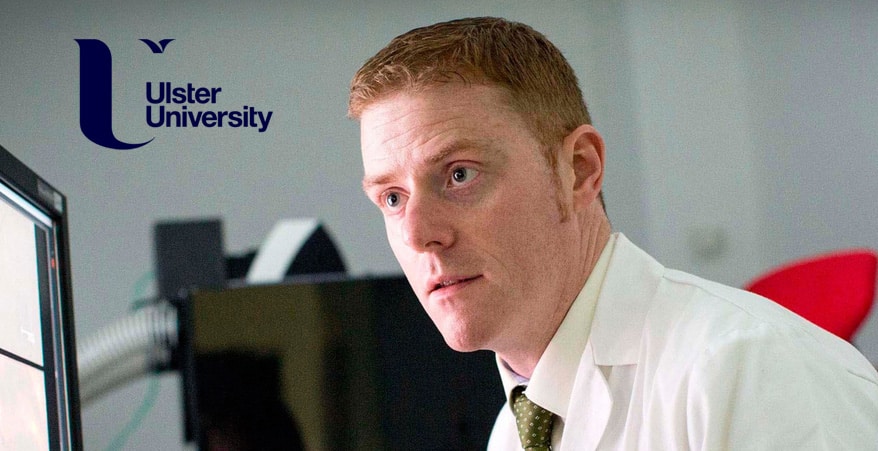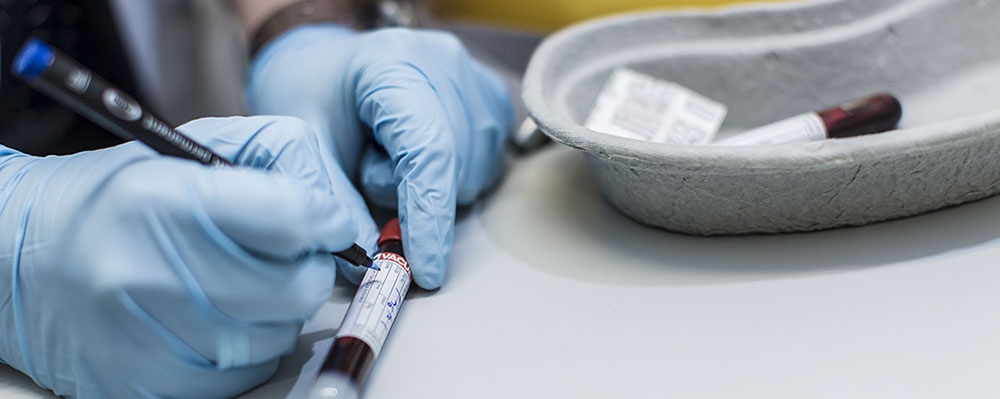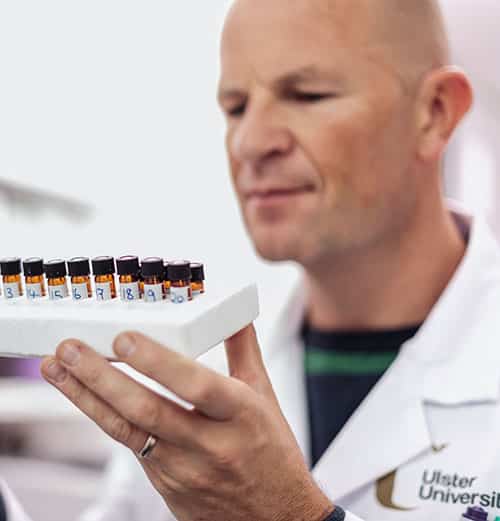Blogs
Keep up with all the latest thoughts and opinions.
We make it happen.
Online Biomedical Science MSc: An Interview with Professor McKenna
Tuesday, July 25th, 2023

Are you interested in studying a Biomedical Science Masters online? We spoke with Professor Declan McKenna, Associate Head of School of Biomedical Sciences at Ulster University, about the online IBMS-accredited Biomedical Science MSc offered at Ulster University.
 Meet Professor Declan McKenna
Meet Professor Declan McKenna
Professor Declan McKenna is Associate Head of the School of Biomedical Sciences at Ulster University (Coleraine Campus, Northern Ireland). He contributes to many undergraduate and postgraduate level courses and is the module coordinator for Haematology in Health and Disease, one of the core specialist modules of the online Biomedical Science MSc.
Sitting among the core academic team, Professor McKenna helps to coordinate the course and acts as an academic supervisor on the Research Project, the final practical module on the Biomedical Science MSc.
How did you first get involved in the field of biomedical science?
I’ve always had an interest in biology. When I did my undergraduate degree in biochemistry, I really enjoyed the side of the course that related to health and medicine. Then I did a PhD in molecular biology, which looked at genetics and how genetic mechanisms underpin disease. From there, I spring-boarded into a postdoctoral career in cancer research, where I also got the chance to lecture and contribute to undergraduate and postgraduate level courses, all under the banner of Biomedical Sciences.
My research looked at how different understandings of the pathology of disease inform how we test for disease, how we diagnose different disorders and how we use that information to improve treatment, particularly in the field of cancer.
What recent developments are shaking up the field?
New technologies like genetics and bioinformatics are helping to drive our understanding. Over the last two decades, there has been a huge advance in the number of new treatments, drugs and targeted approaches to diagnosing disease, prognosis and treating disease. Our research can be used to underpin the impact for real people, patients and people needing help.
The genomics revolution has changed everything. Since the Human Genome Project mapped out the genome, we now know about the molecular and genetic basis of disease and how the pathology of disease effectively starts with genetics and cell biology, and then of course it develops in different ways for different people.
There is a need to be smarter about how we treat people because we need to understand each patient’s own biological makeup. What works for one person might not work for another and if you understand that, then you can have innovative ways to intervene, manage and treat different people with the same disease.
The Biomedical Science MSc is a one-of-a-kind programme that incorporates the latest research and current clinical practices. How does the School achieve this?
At Ulster, we have a very strong research ethos. Our Biomedical Sciences Research Institute is internationally recognised as a high-quality research institute and both our Research Institute and our School of Biomedical Sciences have research-active and academic staff. This means that students at all levels are taught by people who are actively doing specialised research.
Many of our researchers are world-leading experts. They are widely published in high-impact journals and many of them get research funding annually. This means that the content of our courses is informed by cutting-edge research that is exploring new applications and developments in biomedical sciences. In this way, we can point to how things will be in another few years.
[Our scientists] contribute learning content and lecture material and help keep modules up to date, especially with new protocols or systems that are routinely embedded within clinical practice.
Our lab research is helping to move along developments in microbiology, haematology, cell pathology and all the disciplines that exist in the biomedical science field. We have a number of researchers investigating areas such as cancer, diabetes, eye disease and the link between nutrition and health. All this and more comes together holistically to create a strong research ethos.
What is special about this online Biomedical Science MSc programme?
We provide the ability to learn conveniently. We have a collective name across the UK for being a high-quality provider of education in biomedical sciences, both on-campus and via distance learning. Students can be reassured that when they pick this course, they’re following in a long line of successful students who have come through our doors.
We also maintain a link between academic principles and current practice. Our faculty are not just academics who can teach you the principles, they are also researchers who bring pioneering research and experience to the table.
Over the years we have built up a very close working relationship with biomedical scientists working in clinical practice. As well as academics working in our Research Institute and in our university, we also have practicing biomedical scientists contributing on many of the modules.
[In this way] we provide an ever-evolving course that keeps up to date on what the students can expect to do in the workplace. Students can rest assured that they’re getting high-quality education from professionals set to a standard that is accredited and approved by the IBMS and external bodies.
Ulster Online has a strong reputation and is popular among students from various professions. Why is this?
Typically, the students we get on the MSc course are already in employment. They may have other life commitments such as family or other reasons why they can’t come to campus. Distance learning is very good for those people because they have flexibility.
Yes, they have deadlines and a timetable of sorts, but it’s much more flexible than a traditional on-campus timetable. They can work on a schedule that suits them and their personal circumstances. They will have to have good time management skills and carve out time each week for studying alongside other commitments, but students are given guidance on this too.
Our students tend to be quite motivated because they’ve identified the need to get another qualification, typically to progress their career. They’re engaged with the idea of balancing their studies with other commitments and the online nature facilitates that for them. As long as you have a laptop and a research lab to work in, you can work through the modules easily.
Why is IBMS accreditation important?
The Institute of Biomedical Sciences is the UK body for the profession of biomedical sciences and they accredit a number of courses across the UK. As well as maintaining and ensuring the quality of the course, the IBMS provides another layer of interaction and connectivity that students can utilise both during and after the course.
Any student studying on an IBMS-accredited course like ours knows that our academic team meets the standards required by the IBMS, and we are therefore teaching the right content at the right level for students.
The IBMS also provides a lot of different ways for students to progress from a professional point of view. As members of the IBMS, biomedical professionals will have a ready-made network of connections that they can reach out to for help and learn about pathways for progression after graduation.

What support can students expect on each module?
The idea is that any student on any module should have a few different people they can go to for support, depending on the nature of their query or problem.
There’s the module coordinator and the course director, as well as specialist e-tutors and module coordinators who are able to answer specialist queries about the course content. Then there’s the Student Success Team who they can go to regarding more pastoral issues.
This layered approach to support is great, particularly for the distance learning model, where students may never meet their peers in real life. This way, students can reach out and chat to somebody if they need to, and they’ll always be pointed in the right direction and have their problem solved promptly.
How much academic support is there during the practical Research Project module?
The Research Project is typically carried out in the student’s workplace with a work-based laboratory supervisor. The day-to-day practical, hands-on research is under the supervision of their assigned mentor or supervisor.
Students start planning for this project early on and the Applied Research Methods module is designed to help them develop a project proposal. There is strong academic input at this point which is helpful for students who might not be familiar with research, including how to go about setting up a project, how to fashion a hypothesis, how to structure realistic objectives and aims, how to cost it and how to make sure ethics are in place if required.
During the Research Project itself, students have the chance to do impactful work within their own environment. [They] undertake the project in their workplace but they will also have an academic supervisor to support from a troubleshooting point of view, such as if somebody has a change of circumstances.
Towards the end of the project, we also advise on professional standards during the write-up process and students are encouraged to write as if they were writing a report for a publication in a research journal. The researchers in our institute are used to doing that on a daily basis and can advise on that.
In general, members of the course team normally just advise on the academic side, whereas the work-based supervisor takes responsibility for monitoring the project progression and the day-to-day practicalities.
What is the likely progression for students after gaining their MSc?
Most of our students are already on a career progression pathway within biomedical science. They see the Masters as another piece of evidence of their level of knowledge and learning to evidence a promotion, or to move up the ladder in their workplace.
Some of [our students] are quite enthused by the research side of biomedical science and the MSc’s Research Project gives them a flavour of that. Students can develop a real aptitude and liking for the research and that may see them move towards a research career either within a hospital environment or their current workplace.
They might leave their current job and do a PhD programme with us or elsewhere, taking a higher-level research focus. They may leave the profession and look to do something else entirely, with a Masters under their belt. Though this course is subject-specific, there are many transferable skills that can be developed, not least the ability to juggle work, deadlines and assignments, which is useful in any walk of life.
Self-motivation, discipline and critical thinking skills are all needed at Masters level, as well as the ability to critique and evaluate and to come up with your own thinking on a particular topic, which can be applied to any sector.
Progress in your biomedical career with Ulster Online
Study with Professor Declan McKenna on the Biomedical Science MSc and further your career within a specialism of your choice.
This Masters programme offers a choice of four specialist pathways – Cellular Pathology, Clinical Chemistry, Haematology or Medical Microbiology – allowing you to gain up-to-date knowledge and learning in a relevant area of interest.
Most of our students are already working as biomedical scientists and should hold laboratory access to fulfil the requirements for entry. Learn more about the benefits of studying biomedical science with us at postgraduate level.
Study part-time, online for flexible career progression with Ulster Online.



